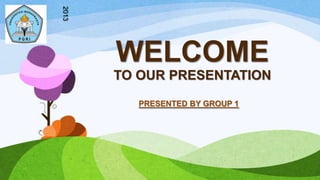
The fact finding stage (assessing societal factors)
- 1. WELCOME TO OUR PRESENTATION PRESENTED BY GROUP 1 2013
- 2. The Fact-finding Stage : Assessing Societal Factors Curriculum & Materials Development By: Intan Safitri Nidya 201012500426 Merryana Christiani 201012500982
- 3. Presentation Outline • Introduction • The Curriculum Development Process • Societal Factors The Language Setting Patterns of Language Use in Society Group and Individual Attitudes Toward Language The Political and National Context • Practical Application • Conclusion
- 4. Introduction • Focal Point: in developing a curriculum/a syllabus, we need to consider the societal factors; societal is the adjective of ‘society’; societal factors are factors which come from the society. • Besides societal factors, there’s another factor called ‘stakeholders’ (learners, teachers, schools, parents, finance, ministry of education, etc.). • Materials development – Socio-cultural appropriateness, link between syllabus and audience.
- 5. The Curriculum Development Process The language curriculum includes specifications for providing inputs to syllabus design and for measuring outcomes of syllabus-based instruction Robert Keith Johnson (1989:28)
- 6. The answers to these questions determine an educational policy 1. Who are the learners? 2. Who are the teachers? 3. Why is the program necessary? 4. Where will the program be implemented? 5. How will it be implemented? THE LANGUAGE SETTING PATTERNS OF LANGUAGE USE IN SOCIETY POLITIICAL AND NATIONAL CONTEXT GROUP AND INDIVIDUAL ATTITUDES The Fact-finding Stage: Assessing Societal Factors
- 7. The Language setting Who are the learners? IN NEED OF SURVIVAL SKILLS SETTLING IN A NEW COMMUNITY COME FOR A LIMITED TIME, FOR A WELL-DEFINED PURPOSE EFL / ESL and LWC
- 8. The Language setting What are the factors? TL English is spoken natively (US/UK) ESL/EFL English is taught as one of several foreign languages. (Indonesia, China, Japan, etc) LWC 1. English is one of two or more official languages (OL) in a country 2. English is the only official language but is not a native language. 3. English is neither NL or OL, but is given a special status because of historical factors.
- 9. LANGUAGEUSE ROLES OF LANGUAGE IN EDUCATION Means to further education Effectiveness of curriculum and materials LANGUAGEUSE ROLES OF LANGUAGE IN THE LABOR MARKET Which profession needs the language and to what extent? To what extent have people required the knowledge of the language? LANGUAGEUSE ROLES OF LANGUAGE IN MODERNIZATION Technological and scientific advancement Instructions and catalogues Overseas training and exposure Dependency on foreign experts The Roles of LWC or ESL/EFL in society. Patterns of Language Use in Society
- 10. Group and Individual Attitudes Towards Language Group Attitudes Attitudes towards the language, people who speak it, and the culture it represents. Individual Attitudes Attitude towards the learning process itself, individual needs, teachers’ efficacy, materials, and school system.
- 11. The Attitudes Towards the Language The positive attitudes will reflect a high regard and appreciation to language and culture, high personal motivation, feeling of self fulfillment, success, and enthusiasm. The negative attitudes are often related to historical factors, political and national trends, social conflicts. They create psychological distance affecting learning-teaching process.
- 12. The Political and National Context POLITICAL CONSIDERATIONS The administration in power and its views of the language NATIONAL CONSIDERATIONS Promoting nationhood, patriotism, development of national language QUESTIONS TO ASK a. local languages for early education, b. the preferred national language for intermediate education, c. an international language for government and higher education
- 13. Practical applications Interview some students inside the class by asking these questions. 1. What are Indonesian learners’ language needs? 2. What are their attitudes towards English and the learning of English? 3. Can learning English or other foreign languages lessen the significance of Indonesian? 4. Are English courses offered in Indonesia sufficient for Indonesian students?
- 14. Conclusion To make a good design for a new language program, as a planner (teacher), we should know all the information about the program and gather it all in one. The process of it is called Fact- finding Stage: Assessing Societal Factors which consist of four major sections: a) The language setting b) Patterns of language use c) Attitudes towards language d) Political and national context
